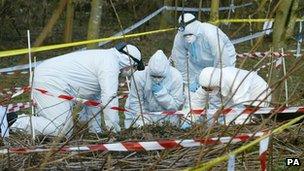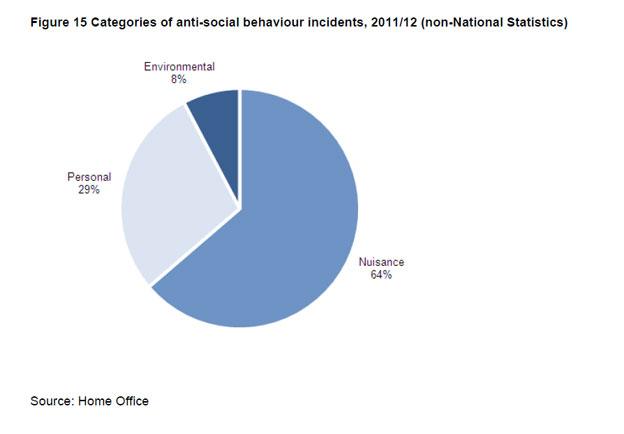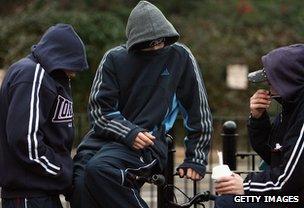Is Britain behaving better?
- Published
- comments
Crime figures: Many believe the fall in homicides is down to better policing
Homicide down. Violence down. Anti-social behaviour down. It really does begin to look as though the country is behaving better.
In Scotland recorded crime is at its lowest level for 37 years, external.
In Northern Ireland it is the lowest since the late 90s, external - the last comparable data.
Today we got figures showing recorded crime in England and Wales, external is at its lowest level in 23 years.
People will refuse to believe it, of course. And I would agree that recorded crime stats are not the best measure of crime trends. (The Crime Survey for England and Wales is better and presents a largely stable picture after big falls since the mid 90s.)
But there is one recorded crime figure that is accepted as a good reference point: the homicide rate. In England and Wales, that is at its lowest level for 29 years.

The number of killings reached a peak of nearly 1,000 a decade ago
You really cannot fiddle the homicide figures and the level of murder and manslaughter is likely to correlate with the level of violence in a society. The trend has been down for a decade. (GBH has also fallen significantly, incidentally.)
From murder at one end, there are interesting stats on "anti-social behaviour" at the other. In 2007/08 there were almost 3.9 million incidents of anti-social behaviour recorded by English and Welsh police. Last year it had fallen to 2.7 million - a 30% reduction in five years.
Concerns about ASB are not a bad measure of people's sense of the society around them - probably better than really serious crime since far more people are affected.
Today's crime data release describes the long-term trend in respect of ASB as "a prevailing decrease in the perceived level," although worries about noisy neighbours and drunk or rowdy behaviour remain relatively flat.
Nevertheless, the government is convinced that concerns about anti-social behaviour require new legislation and published a White Paper in May entitled Putting Victims First: More Effective Responses to Anti-Social Behaviour, external.
What struck me reading it is how the definition of anti-social behaviour has been expanding, evidence perhaps of changing attitudes on what we regard as acceptable.
It is clearly anti-social to hit someone or smash their windows. Is it also anti-social to be a bit annoying?
The Home Office website defines anti-social behaviour as "any aggressive, intimidating or destructive activity that damages or destroys another person's quality of life, external".
The White Paper offers a wider definition including "a range of nuisances, disorder and crimes which affects people's lives on a daily basis: from vandalism and graffiti; to drunk or rowdy behaviour in public; to intimidation and harassment."
Further down, the document has another go and describes ASB as "a broad term" used to describe "incidents that make many people's lives in this country a misery - from litter and vandalism, to public drunkenness or aggressive dogs, to noisy or abusive neighbours."
The word "nuisance" has crept into the definition, you will notice, and in a footnote the White Paper authors explain that when using the word "we refer to the dictionary, rather than a specific legal, definition of 'nuisance'. For example, we do not mean nuisance as defined in the Environmental Protection Act 1990."
The EPA, just to remind you, defines a Statutory Nuisance as needing "to pose a threat to health or to have a significant affect on another person. It must therefore be more than just an annoyance or irritation."
My Oxford English Dictionary, however, does define nuisance as "an annoyance" or "an obnoxious practice".
Today's crime figures use yet another definition of ASB - "a new set of three simplified categories," the first of which is "nuisance".
Nuisance - captures incidents where an act, condition, thing or person causes trouble, annoyance, irritation, inconvenience, offence or suffering to the local community in general rather than to individual victims.
Personal - captures incidents that are perceived as either deliberately targeted at an individual or group, or having an impact on an individual or group rather than the community at large.
Environmental - captures incidents where individuals and groups have an impact on their surroundings, including natural, built and social environments.
A pie-chart reveals that the bulk of concern (64%) is with the nuisance category.

So, from "aggressive, intimidating or destructive activity that damages or destroys another person's quality of life" we have broadened our definition to cover things that are a bit irritating.
I remember chatting to a community constable about ASB and she said that very often she would be called up to deal with kids who were allegedly being anti-social. On arriving, she would discover that the problem was that they were playing football or just standing around chatting.
So who was being anti-social? The children playing or the resident who repeatedly calls up the cops to try and prevent young people doing something entirely lawful?
As the White Paper says: "despite common perceptions, young people are just as likely as older people to identify ASB as a local problem".

Asbos were introduced in 1998 under Tony Blair
The White Paper also accepts that much of what is described as ASB is criminal (vandalism, graffiti, dangerous dogs, street drug dealing and people being drunk and disorderly are already dealt with under the criminal law), but the government believes that civil powers should be available to give the police an alternative when, in the words of the White Paper, "it is difficult to prove that an offence had been committed".
This gets to the heart of the issue. Almost every activity that might be defined as "aggressive, intimidating or destructive activity that damages or destroys another person's quality of life" is already criminal. Some of the annoying stuff, the nuisance, the irritating things are either lawful or are hard to prosecute.
Politicians know the voters want "something to be done" but evidence published today by the University of Leeds, external shows that punishment is less effective than encouragement in getting people to behave well.
The new Crime Prevention Injunction to be used on individuals as young as 10 is sold as a streamlined ASBO. Breaches would constitute contempt of court and could result in custody. But the Leeds research raises concerns that the new tool "will lower the threshold of court-based intervention and disrupt existing preventative pre-ASBO work."
Perhaps we should be looking at why it is that, despite all the doom-mongers saying that it was "blindingly obvious" that crime would rise in a recession or that Britain was bound for hell in a handcart, there is so much evidence that behaviour is generally improving.